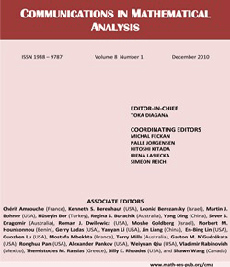Abstract
We obtain a uniform ergodic theorem for the sequence $\frac1{s(n)} \sum_{k=0}^n(\varDelta s)(n-k)\,T^k$, where $\varDelta$ is the inverse of the endomorphism on the vector space of scalar sequences which maps each sequence into the sequence of its partial sums, $T$ is a bounded linear operator on a Banach space and $s$ is a divergent nondecreasing sequence of strictly positive real numbers, such that $\lim_{n\rightarrow+\infty} s(n+1)/s(n)=1$ and $\varDelta^qs\in\ell_1$ for some positive integer $q$. Indeed, we prove that if $T^{n}/s(n$) converges to zero in the uniform operator topology, then the sequence of averages above converges in the same topology if and only if $1$ is either in the resolvent set of $T$, or a simple pole of the resolvent function of $T$.
Citation
Laura Burlando. "A Uniform Ergodic Theorem for Some Nörlund Means." Commun. Math. Anal. 21 (2) 1 - 34, 2018.
Information





